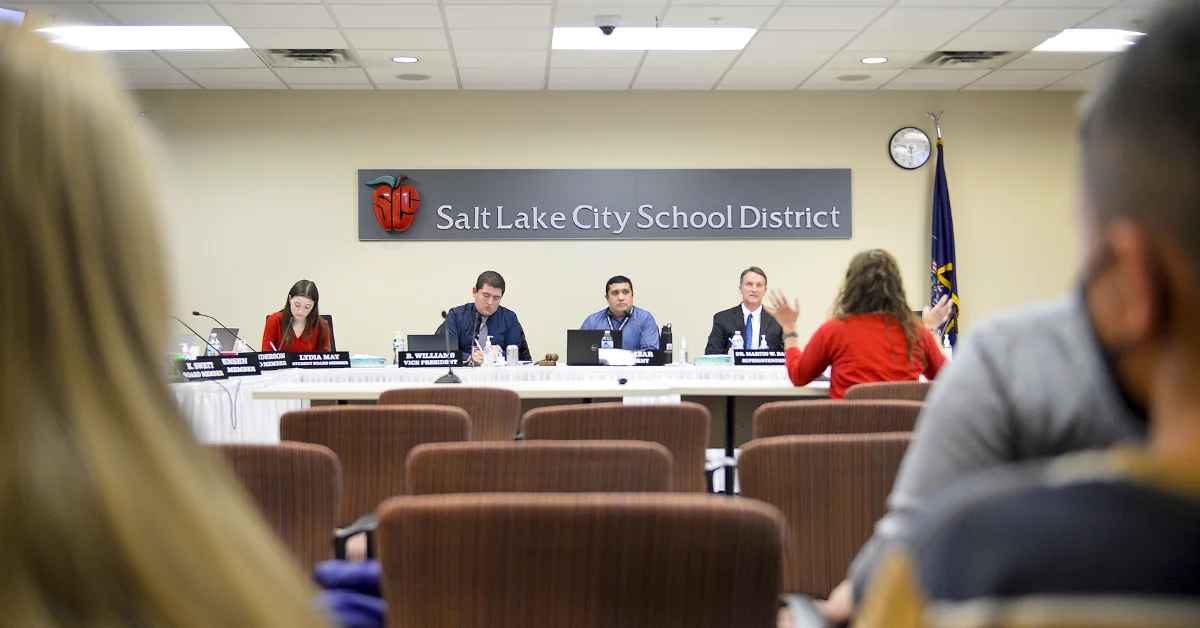The final week of classes had passed, and Skyridge High School had stopped recording attendance.
The Alpine School District had a practice that allowed students to depart after two hours of instruction. Teenagers were loitering in the hallways.
According to his parents, one student used unsupervised time in May 2022 to have s*x with his girlfriend three times while in class in the Lehi campus parking lot.
The Latter-day Saint couple, whose religion forbids premarital s*x, then filed a lawsuit against the district and some administrators, claiming that their constitutional rights to raise their kids and practice their religion freely had been violated.
Axios Salt Lake City’s newsletter was the first to report on U.S. District Judge Jill Parrish’s judgment earlier this month, which gave those allegations a failing grade.
According to her, the complaint’s central claim was that because the district allowed students to have free time during the last week of classes, it did not do enough “to aid their efforts as parents to prevent [their son] JD from having sex.”
The parents, who were only given their first names, John and Jane Doe, “have not provided any authority supporting the proposition that the government has a constitutional duty to help them parent JD,” Parrish ruled.
According to their lawsuit, the parents intended to prevent the district from easing attendance policies for the end of the school year.
According to a statement issued by their lawyers at Mitchell Barlow & Mansfield in Salt Lake City, they were unhappy at the judgment and are “considering other options for relief.”
“Ultimately, it should not be this difficult to ensure that the school district complies with its own policies requiring attendance, the taking of roll, and the supervision of students,” the parents stated.
“We have tried to seek relief without pursuing litigation, but the school district would not agree to reasonable terms outside of court. At the end of the day, we would like the school district to step up and comply with its legal obligations. It’s disappointing the school district has refused to follow the policies in place to protect our children.”
A request for comment from the district received no response.
The Right To Parent A Child
The Does said that despite bringing their son up by the teachings of The Church of Jesus Christ of Latter-day Saints, they later learned that he was having s*x with his girlfriend.
The judgement said that they had taken actions to stop him, “such as requiring him to be accompanied by other persons when he was with his girlfriend and requiring JD to travel to and from school with his older sibling.”
The parents of a Utah County high school student who had sex with his girlfriend in the school’s parking lot argued their rights to parent him and to practice their religion had been violated. A judge disagreed.https://t.co/QcRBtqPslv
— The Salt Lake Tribune (@sltrib) June 29, 2023
JD’s mother came to get him up on Wednesday of the penultimate week of school, but the office staff informed her that the pupils were not in their classes.
The judgement stated that when JD ignored a request to come to the workplace, his mother searched for him. She discovered him in the parking lot only after calling his girlfriend.
According to prior courts, the 14th Amendment protects parents’ fundamental right “to make decisions concerning the care, custody, and control of their children,” including “the constitutional right to direct a child’s education.”
The Does allege that the school district had violated this right. Parrish, however, argued that the school system had not “burdened their right to make decisions concerning the care or control of their son.”
“The district did not prevent the Does from forbidding JD from engaging in premarital sex,” Parrish wrote. “Nor do they complain that the district required JD to attend a sex education class that undermined the values they sought to instill in their son.”
She concluded: “Because the Alpine School District did not prevent the Does from making decisions regarding the upbringing of their son, it did not infringe their parental rights under the Fourteenth Amendment.”
The parents also claimed that the school district had violated their rights by failing to inform them of the flexible attendance policies that week, depriving them of the chance to decide how to raise JD in light of that knowledge.
She pointed out that Parrish also denied that “it may be wise for schools to adhere to attendance policies and keep parents informed of students’ whereabouts and schedules.”
The Right To Practice Religion
The district, according to the Does, “provided the opportunity for JD to engage in premarital sex while on school grounds,” which infringed on the family’s right to the free exercise of religion.
Parrish disagreed, stating there was no proof the district had forced the family to abandon or practice anti-religious behaviour. Parrish said, “the school district did not pressure JD into acting contrary to his religious beliefs.”
Even though it was against his religion’s precepts, “he freely chose to have premarital sex with his girlfriend.”
To learn more about the news of other famous schools, read the posts we’ve included below:
- River Bluff High Principal And Family’s Car Accident In Hawaii
- Supreme Court’s Landmark Ruling Delivers A Setback To Medical School Diversity
- The Controversial Role Of Scot Peterson In The Parkland School Shooting: Justice Or Jail?
The Does were not coerced or forced by the district to limit the religious upbringing of their kid, she continued. Instead, she noted, the Does claimed that not enough was being done by the section to support them in upholding their religious views.
“Here, the Does argue that the Free Exercise Clause requires the Alpine School District to modify its policies to help them perform their religious duty to raise JD to avoid premarital sex,” the decision stated.
“But the district has no constitutional duty to modify its internal procedures to further the Does’ religious goals.”
One More Argument
The Does claimed that the school district’s negligence of JD violated its duty of care, “causing him emotional distress.”
They said individual administrators are shielded from prosecution by the Governmental Immunity Act of Utah (GIA), but they contended the same law does not cover the Alpine School District.
Parrish decided to take their state law-based negligence suit to a state court.
“The Does have raised an admittedly novel interpretation of the Utah GIA,” she wrote, “that should be resolved by a state court rather than a federal court.”
Tyler is a passionate journalist with a keen eye for detail and a deep love for uncovering the truth. With years of experience covering a wide range of topics, Tyler has a proven track record of delivering insightful and thought-provoking articles to readers everywhere. Whether it’s breaking news, in-depth investigations, or behind-the-scenes looks at the world of politics and entertainment, Tyler has a unique ability to bring a story to life and make it relevant to audiences everywhere. When he’s not writing, you can find Tyler exploring new cultures, trying new foods, and soaking up the beauty of the world around him.
Contents











